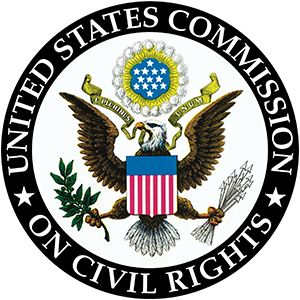
United States Commission on Civil Rights
The U.S. Commission on Civil Rights (CCR) is a bipartisan, independent commission of the United States federal government, created by the Civil Rights Act of 1957 during the Eisenhower administration, that is charged with the responsibility for investigating, reporting on, and making recommendations concerning civil rights issues in the United States. Specifically, the CCR investigates allegations of discrimination based on race, sex, national origin, disability.[1] In December 2023, Rochelle Mercedes Garza was appointed to serve as Chair of the CCR. She is the youngest person to be appointed to the position.[2]
Agency overview
The commission is composed of eight commissioners. Four are appointed by the President of the United States, two by the President Pro Tempore of the Senate (upon the recommendations of the Senate majority leader and minority leader), and two by the Speaker of the House of Representatives (upon the recommendations of the House majority leader and minority leader).[5]
As of December 2022, the members of the commission are:[6]
Presidential appointees (2D, 2R):
Senate appointees (1D, 1I):
House appointees (1D, 1R):
History[edit]
Creation and early history[edit]
The commission was created by the Civil Rights Act of 1957, which was signed into law by President Dwight D. Eisenhower in response to a recommendation by an ad hoc President's Committee on Civil Rights. In calling for a permanent commission, that committee stated:
Commission structure[edit]
The eight commissioners serve six-year staggered terms. Four are appointed by the President, two by the President Pro Tempore of the Senate and two by the Speaker of the House of Representatives. No more than four Commissioners can be of the same political party. In addition, neither the two Senate appointees nor the two House appointees may be of the same political party. With the concurrence of a majority of the commission's members, the President designates a chair and a Vice Chair. The Staff Director is also appointed by the President with the concurrence of a majority of the Commissioners.
The commission has appointed 51 State Advisory Committees (SACs) to function as the "eyes and ears" of the Commission in their respective locations. The commission's enabling legislation authorizes the creation of these SACs and directs the commission to establish at least one advisory committee in every state and the District of Columbia. Each state committee has a charter that enables it to operate and identifies its members. Each charter is valid for a term of two years, and the committee terminates if the charter is not renewed by the commission. Each committee has a minimum of eleven members. The SACs are supported by regional offices whose primary function is to assist them in their planning, fact-finding, and reporting activities. Like the commission, the SACs produce written reports that are based on fact-finding hearings and other public meetings.
Commission operations[edit]
The commission studies alleged discrimination based on race, color, religion, sex, age, disability, or national origin. It also studies alleged deprivations of voting rights and discrimination in the administration of justice. Though the commission has no enforcement powers, its commissioners try to enhance the enforcement of federal civil rights laws. Its recommendations often lead to action in Congress.[29]
Commissioners hold monthly daylong meetings, including six briefings on subjects, chosen by the commissioners, that involve possible discrimination. Ahead of these meetings, commission staff prepares reports on those subjects and schedules appearances by witnesses. Each year the Commission drafts recommendations that are sent to Congress by September 30.[29]
Books
Journals